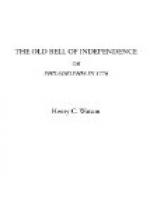“About daylight, Jones and his party reached the wood near Sykes’ lime-kiln, and halted to reconnoitre. Sykes and four of his men were at work at that early hour. The lime was burning, and some of the men were engaged in loading and unloading two carts which stood near the kiln. Captain Jones’ plan was quickly formed. He sent one half his party around to cut off the escape of Sykes towards the city, and when he thought they had reached a favorable position sallied out towards the kiln. When he was about half-way to it, Sykes discovered the party, and, shouting to his men to follow, ran along the bank of the river to escape; but the other party cut off retreat, and Jones coming up rapidly, Sykes and his men were taken. Jones did not intend to detain the workmen any longer than till he got out of the reach of the British, when he would not have cared for their giving the alarm. Sykes seemed to be very anxious to know why he was arrested in that manner; but Jones simply told him he would know when they got him to the American camp; and that, if Sykes had not thought of a reason for his arrest, he would not have attempted to run away. Well, the Americans hurried the prisoners towards the wood, but Jones soon descried a large party of British coming over a neighboring hill, and knew that his chance was a desperate one. Sykes also discovered the party of red-coats, and struggled hard to make his escape from the Americans. Jones wanted to bring him alive to the American camp, or he would have shot him down at once. Suddenly, Sykes broke away from his captors, and ran towards the lime-kiln. Several muskets were discharged, but all missed him. Then one of the privates, named Janvers, a daring fellow, rushed after the prisoner, and caught him just as he reached the kiln. There a fierce struggle ensued; but Sykes was cut in the shoulder, and, in attempting to throw his antagonist into the hot lime and fire, was hurled into it himself. Then Janvers hurried to the woods after his brave comrades. The British party was near enough to see the struggle at the limekiln, and came on rapidly in pursuit of our men. A few of the red-coats were ordered to examine the lime-kiln, to see if Sykes was alive and concealed; and they found his body burned almost to a crisp.”
“Horrible!” exclaimed Mrs. Harmar.
“Well,” continued Old Harmar, “there was a long and doubtful race between the two parties; but Jones succeeded in getting within the lines of the Americans without losing a man, and with his four prisoners in safe custody. These fellows were examined, but no evidence of their being spies and confidants of Sykes could be produced, and they were discharged with the promise of a terrible punishment if they were detected tampering with the enemy.”
“Captain Jones was a daring fellow to venture so near the British lines, and with such a small party,” observed Morton.
“In such an attempt, a small party was preferable. Its success depended upon secrecy and quickness of movements,” said Wilson.




